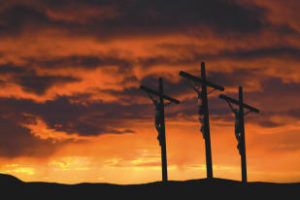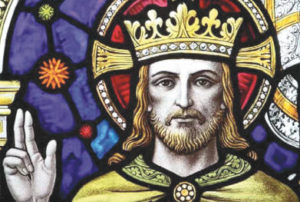Every now and again I am asked which of the four Gospels is my favorite. That is a difficult question to answer because, while there are four, together they form one Gospel of Jesus Christ. Each has parts that stand out for me. Mark is the oldest and arguably the most reliable concerning many of the sayings of Jesus. Matthew gives us part of the Infancy Narratives, along with Luke, especially the story of the Magi. John is very theological. It’s the last of the Gospels and is able to assume a base knowledge that already exists among believers because of the three texts before it therefore its language and teaching is more exalted. This leaves us with Luke whose Gospel does have a special place in my heart because it gives us the image of Jesus as the loving divine physician.
 The passage from Luke for this Sunday, the Solemnity of Christ the King, may be one of the last passages that we would think of having for this day as it presents us with Christ crucified; not the most kingly presentation from a worldly point of view. As Jesus hangs on the cross, he is mocked three times by the “rulers” who are most likely the Jewish religious authorities, the soldiers, and by one of the criminals crucified alongside Jesus. Each mockery is about challenging Jesus to save himself if he truly is the Messiah. The last mockery from the criminal also comes with a plea for Jesus to save him from the agony and death that he is experiencing as well. All three mockeries can be summed up as “save yourself from the pain and suffering of this life and we will believe.” That’s the messiah the world wants and at times it may be the messiah that we want, but that is not the Messiah who is Jesus Christ.
The passage from Luke for this Sunday, the Solemnity of Christ the King, may be one of the last passages that we would think of having for this day as it presents us with Christ crucified; not the most kingly presentation from a worldly point of view. As Jesus hangs on the cross, he is mocked three times by the “rulers” who are most likely the Jewish religious authorities, the soldiers, and by one of the criminals crucified alongside Jesus. Each mockery is about challenging Jesus to save himself if he truly is the Messiah. The last mockery from the criminal also comes with a plea for Jesus to save him from the agony and death that he is experiencing as well. All three mockeries can be summed up as “save yourself from the pain and suffering of this life and we will believe.” That’s the messiah the world wants and at times it may be the messiah that we want, but that is not the Messiah who is Jesus Christ.
The other criminal gets it right. Tradition calls him “the good thief” and names him Dismas, but of that we can’t be sure and we don’t know his crimes, which were probably more heinous than robbery given that he and his accomplice are being crucified by the Romans. This criminal acknowledges his guilt and his repentance is implied in his stating that his punishment is just, he acknowledges the innocence of Jesus, and then follows one of the most beautiful exchanges in all of the Scriptures when he makes his own profession of faith: “Jesus, remember me when you come into your Kingdom” to which our Lord replies “today you will be with me in Paradise.”
 The salvation that our Lord Jesus has accomplished is for us but it is not for this life. Salvation does not mean that we will be spared from the heartaches and sufferings that are inevitable because of sin. The repentant criminal appears to understand that Christ’s Kingdom truly is not of this world and that the salvation that he is accomplishing will be revealed only through our own exodus from this life.
The salvation that our Lord Jesus has accomplished is for us but it is not for this life. Salvation does not mean that we will be spared from the heartaches and sufferings that are inevitable because of sin. The repentant criminal appears to understand that Christ’s Kingdom truly is not of this world and that the salvation that he is accomplishing will be revealed only through our own exodus from this life.
As we celebrate this great feast of Christ the King and in times when we may be tempted to expect God to save us from the trials of this life, may we remember that God will save us but that his salvation is not about this world but liberation from it. Those who mocked the Lord could not see beyond this present life and still the world continues to mock the crucified Lord today as it holds on to a reality that is fleeting. Thanks be to God that we are called to a hope beyond this world, to a greater life to be revealed, to something better than this world could ever offer. As we prepare for the Season of Advent, let us be mindful that as Christ has come so he will return again in glory with salvation for those who live and die in him. May the grace of Christ lift our minds beyond the cares of this life to the Paradise to be revealed. Thy Kingdom come!
Father Christopher House is the Rector of the Cathedral and serves in various leadership roles within the diocesan curia, namely Chancellor and Vicar Judicial.